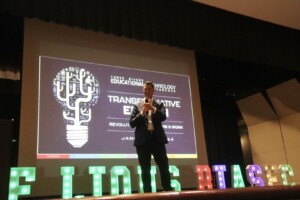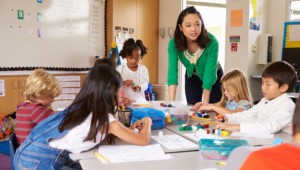Vanessa’s Journey: Empowering Special Education Through Technology

Karla Phillips
My daughter’s story started like many children born with special needs – doctors telling us not to expect much. I did my research and discovered that visual learning may be one of her unique abilities. It’s turned out to be true.
Like any good Type A, control-freak, helicopter mom, I had been making my daughter watch educational videos pretty much since birth, but the truth is that because she was still non-verbal at two-to-three years old I had no idea if she was learning much. And then I bought an iPod . . .
A friend sent me a list of suggested pre-K apps and I ventured into iTunes and began downloading.
Sometime later, we were at dinner with grandma and grandpa. I was playing with my new toy with my daughter sitting on my lap. I opened a very simple (yes, it was free) app that asked kids to identify numbers, letters, shapes, etc. What happened next forever changed how I view her educational prospects and fueled my passion and advocacy for her.
By simple touch, she answered all the prompts correctly! Okay maybe one or two wrong but enough to blow my mind. All she needed was another way to demonstrate what she had learned. In education speak we call this an alternate assessment.
I wasn’t the only one blown away. Grandma and Grandpa sent iPads the next week.
We have now moved past the pre-K apps to more age-appropriate reading and math apps. And guess what? Like any other child she much prefers game-based learning versus worksheets. Shocking, right?
Since that first iPod experience (and it has been reaffirmed many times over) I knew that her abilities are even greater than I can imagine and my journey would be about finding ways for her to show the world. Technology is a big part of that plan.
The irony is that I’m describing her home life. Even though she is in a fantastic “A”-rated school, fully mainstreamed with her typical peers, and great teachers that have high expectations for her, it is a very traditional classroom environment.
What I have discovered is that we haven’t even begun to scratch the surface of technology’s ability to help us increase academic achievement for children with special needs. Many are now suggesting that online courses are a viable option for students with special needs. I’m not advocating merely for increased use of “assistive technology” as it is referred to in special education, but the expanded use of the same technology serving traditional students to increase engagement and facilitate blended learning.
After all, there is one thing we know about all kids… the sky’s the limit!
This blog is part of our Smart Parents Series in partnership with the Nellie Mae Education Foundation. For more information about the project see Parents, Tell Your Story: How You Empower Student Learning as well as other blogs:
- Parents as Chief Advocates
- Early Childhood Learning is Critical for Our Own Kids’ Future…and the Nation’s
- The Power of Personal Relationship in Personalized Learning

Karla Phillips is Policy Director at the Foundation for Excellence in Education. Follow her on Twitter @azkarla.




Daniel
Wow! Fantastic experience - thank you for sharing! There need to be more "non-traditional" educational opportunities for special needs children. Technology (and love) are the keys - along with individualized learning. Whatever works best for the child and shows improvement or progress, run with it!